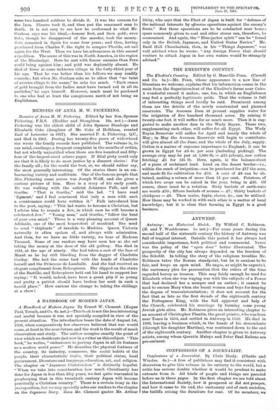A Handbook of Modern Japan. By Ernest W. Clement. (Kegan
Paul, Trench, and Co. 6s. net.)—This book is not the less interesting and useful because it was not specially compiled in view of the present situation. The introduction bears the date of August 1st, 1903, when comparatively few observers believed that war would come, at least in the near future, and the work is the result of much observation and study. The author occupies exactly the point of view which we desiderate just now in a writer on this subject. "This book," he writes, "endeavours to portray Japan in all its features as a modern world power." He describes the physical features of the country, its industry, commerce, the social habits of the people, their characteristic traits, their political status, local government, literature and language, education, art, and religion. The chapter on "Japanese Christendom" is distinctly hopeful. "When we take into consideration how much Christianity has done for Japan in less than fifty years, we feel quite warranted in prophesying that in this twentieth century Japan will become practically a Christian country." There is a certain irony in the juxtaposition, but we may specially refer our readers to the chapter on the Japanese Navy. Here Mr. Clement quotes Mr. Arthur Di6sy, who says that the Fleet of Japan is built for "defence of the national interests by offensive operations against the enemy's fleets." But these operations are to be conducted near home ; space commonly given to coal and other stores can, therefore, be economised. And again, the "Blue-jacket spirit" can be "found only in the British, Japanese, and United States Navies." Mr. Basil Hall Chamberlain, then, in his "Things Japanese," was well advised when he wrote: "Any foreign Power that should venture to attack Japan in her own waters would be strangely advised."
THE KHEDIVE'S COUNTRY.


























































 Previous page
Previous page